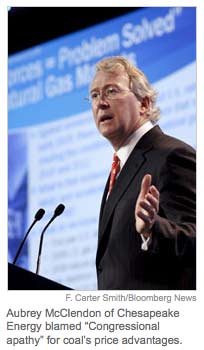Sixty Lame Minutes
Publication Type:
Video RecordingSource:
Post Carbon Institute | Leading the transition to a resilient world (2010)URL:
http://www.postcarbon.org/blog-post/183933-sixty-lame-minutesKeywords:
expertsNotes:
Good job Mr. Kunstler!
If you're offended by salty language, he may not be for you, but the tricks of Big Gas should offend you a whole helluva lot more.
The real story of what happened to the family in Texas that Ms. Stahl did not go into nearly enough. Fracking also reduced their land value from $257,330 on the 2010 tax rolls to its current value of $75,340.
--Vincent Alabama Confidential, outspoken Alabama political bloggers.
So, last night [2010-11-14] CBS hauled Aubrey McClendon, CEO of Chesapeake Energy, on board their flagship Sunday infotainment vehicle, 60 Minutes, to blow a mighty wind up America's ass (as they say in professional PR circles). America is lately addicted to lying to itself, and 60 Minutes has become the "go-to" patsy for funneling disinformation into an already hopelessly confused, wishful, delusional, US public.
McClendon told the credulous Leslie Stahl and the huge viewing audience that America "has two Saudi Arabia's of gas." Now, you know immediately that at least half the viewers misconstrued this statement to mean that we have two Saudi Arabia's of gasoline.
Translation: don't worry none about driving anywhere you like, or having to get some tiny little pansy-ass hybrid whatchamacallit car to do it in, and especially don't pay no attention to them "green" sumbitches on the sidelines trying to sell you some kind of peak oil story.... It also prepared the public to support whatever Mr. McClendon's company wants to do, because he says his company will free America from its slavery to OPEC. By the way, CBS never clarified these parts of the story by the end of the show.
Fossil fuels have powered human growth and ingenuity for centuries. Now that we're reaching the end of cheap and abundant oil and coal supplies, we're in for an exciting ride. While there's a real risk that we'll fall off a cliff, there's still time to control our transition to a post-carbon future.
See:Heinberg, Richard, and Daniel Lerch. The Post Carbon Reader: Managing the 21st Century's Sustainability Crises. 1st ed. University of California Press, 2010.
Music clip used in video below: Reed, Lou. Walk On The Wild Side (1972). RCA/BMG Heritage, 2002.
Post Carbon Institute provides individuals, communities, businesses, and governments with the resources needed to understand and respond to the interrelated economic, energy, and environmental crises that define the 21st century. We envision a world of resilient communities and re-localized economies that thrive within ecological bounds.
Climate change, the end of cheap fossil fuels, and our growth-dependent global economy are creating challenges of a scale and complexity never before seen. These unprecedented challenges call for wholly new approaches.
Post Carbon Institute has gathered 29 of the world's leading experts to point the way forward through a systems oriented, interdisciplinary, and collaborative approach. Through strong partnerships with the Transition Initiative movement and other leading innovators, we work to transform lives and communities through a powerful combination of integrated thinking and replicable direct action. These symbiotic relationships among on-the-ground leaders and grassroots organizers provide the opportunity to immediately implement and test generated ideas and strategies.
The Institute has developed a number of programs and initiatives that further its mission. Visit our program page to learn more.
See: Paul Tolme. 2010-05-14. National Wildlife Federation. "The Dirty Truth Behind Clean Natural Gas".
Flavin, C., and S. Kitasei. The Role of Natural Gas in a Low-Carbon Energy Economy. Briefing paper. Natural Gas and Sustainable Energy Initiative. Washington, D.C.: Worldwatch Institute, 2010. (PDF, 617kb)
Read this assessment by Robert W. Howarth, of Cornell University, who writes, "natural gas is far less attractive than other fossil fuels in terms of the consequences for global warming."
See: Natural Gas Drillers Protest Nomination of Fracking Critics for EPA Review Panel







